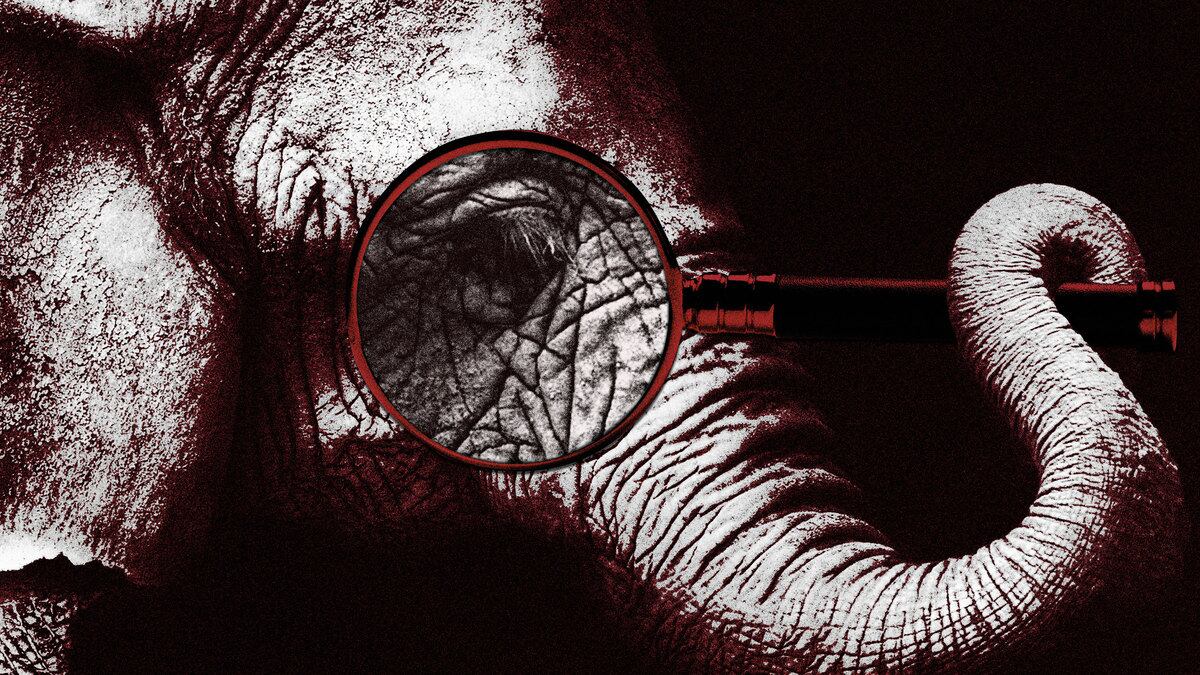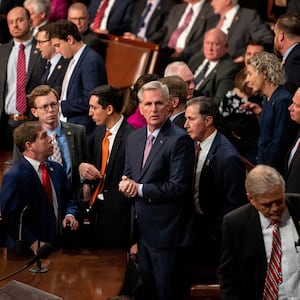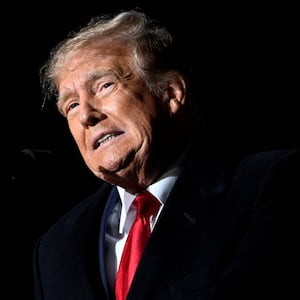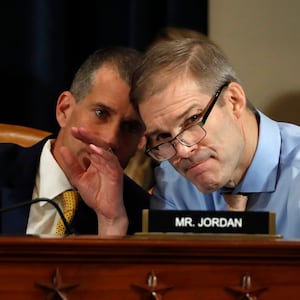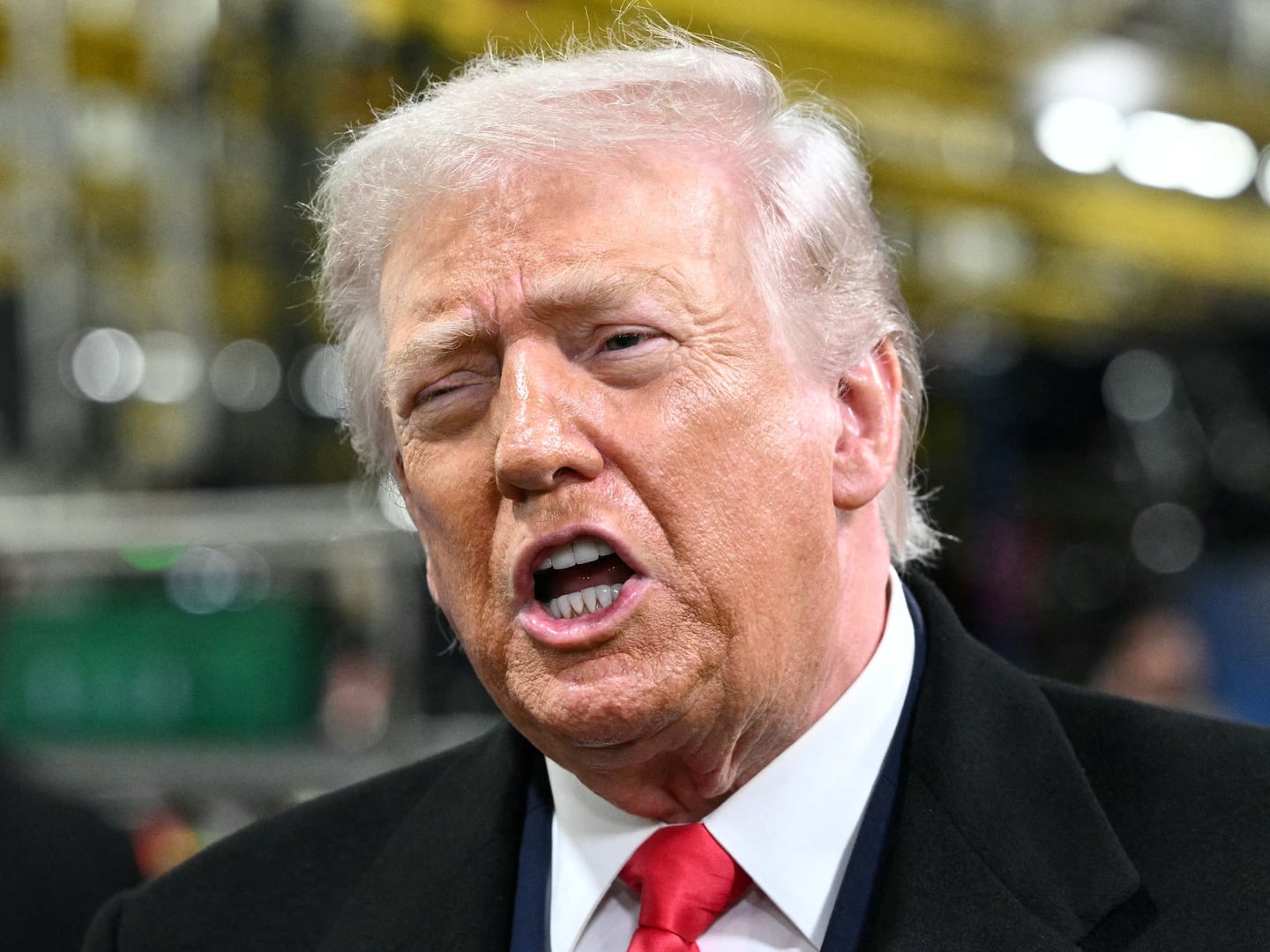Days into controlling the U.S. House, Republicans quickly tackled the creation of one of their top agenda items: a special congressional panel focused on alleged “weaponization of the federal government.”
The committee that all Republicans voted to establish on Tuesday—as part of the House Judiciary Committee—has broad powers to investigate current and past investigations conducted by the FBI and Department of Justice, as well as the authority to probe “any” issues related to the civil liberties of private citizens.
GOP lawmakers speak expansively about the committee’s purview, comparing it to the Church Committee of the 1970s, which exposed an array of intelligence agency abuses. Rep. Steve Scalise (R-LA), the No. 2 Republican, said the new panel would be focused on the protection of “everyday” American citizens.
Just don’t say that the committee is animated by the concerns it appears to share with a certain former president who happens to have very strong opinions about federal law enforcement.
“If you make the mistake of thinking it’s not a serious committee, that it’s all about, like, re-litigating some personal grievance of a politician… you will end up looking silly later on,” claimed Rep. Thomas Massie (R-KY).
“Like every story you write, make sure you don’t look like a bloomin’ idiot in six months when we blow the lid off of this,” Massie told The Daily Beast, “and you look like an apologist for the spy state.”
Based on what top Republicans have said, the committee is poised to hit a GOP sweet spot of tackling broader issues of importance to the party base while allowing themselves many chances to attack President Joe Biden and his administration.
Rep. Jim Jordan (R-OH), already named the panel’s chairman, has said it will prioritize probing the Biden DOJ’s handling of school board protests, COVID measures, and alleged censorship of conservatives on social media, among other things. In a speech from the House floor on Tuesday, Jordan did not mention Trump’s name once.
But Republicans get most animated when they talk about using the committee to tackle what they call “FBI politicization.”
Over the years, that term has largely served as shorthand for federal law enforcement going after Trump, his associates, and his supporters for alleged criminal violations. Momentum for such a panel was supercharged after the FBI searched Mar-a-Lago in August, when now-Speaker Kevin McCarthy publicly told Attorney General Merrick Garland to “preserve your documents and clear your calendar.”
Federal law enforcement has hardly been popular on the left, where many figures have long criticized its abuses and overreach regardless of partisan concerns. Republicans, like Massie, sought to appeal to Democrats’ sensibilities, saying the new Church Committee’s concerns will align with their concerns about overreach and privacy.
Democrats, it is safe to say, are not viewing the panel as a vehicle for high-minded protection of civil liberties. Within the resolution that passed on party lines Tuesday, the provision causing the most alarm among them is one that allows it to investigate investigations conducted by the DOJ, FBI, and Department of Homeland Security.
But some Democrats read that as an explicit green light for Republicans to probe the DOJ’s ongoing special counsel-led probe into Trump and his efforts to overturn the 2020 election, as well as its sprawling investigations related to the Jan. 6 attack on the U.S. Capitol.
“They are authorizing a committee to meddle in ongoing law enforcement investigations,” said Rep. Ted Lieu (D-CA), a Judiciary Committee member. “That’s insane.”
Republicans are set to struggle mightily if they attempt to uncover details of ongoing criminal probes, given the broad inability of law enforcement to divulge such details. Some lawmakers seem to acknowledge this. Rep. Chip Roy (R-TX), who pushed for the panel as part of negotiations over McCarthy’s speakership, indicated a priority for the panel would be injecting the GOP’s views into the national bloodstream.
“We believe we needed a focused committee, partially for messaging, that demonstrates the seriousness of it,” Roy said. “To focus on how now too many of our governmental agencies are collecting information on people, putting them on the lists, targeting them. And we want to highlight that.”
Regardless the broadness of its scope, the new Committee on the Weaponization of the Federal Government—or the WTFG—is squarely the product of the four years House Republicans spent decrying and fighting Democrats’ probes into Trump, from his campaign’s ties with Russia to his efforts to pressure Ukraine for political favors to his stoking of the Big Lie.
Top Republicans like Jordan have spent those years sharpening their knives and vowing to exact revenge of their own when they took the majority. Democrats who weathered those often circus-like hearings of the Trump era seem to be bracing for a rerun of those episodes—but this time, on steroids.
“It’s going to be led by Jim Jordan,” said Rep. Pramila Jayapal (D-WA), a Judiciary member. “So that tells you what kind of approach they’re going to take. It’s going to be about defunding the FBI and protecting insurrectionists.”
Aside from Jordan’s role, little is known yet about the composition of the committee. Members of both parties seemed confused on Tuesday about how it might be populated, aside from knowing that McCarthy and Minority Leader Hakeem Jeffries (D-NY) will make the selections.
But the text of the resolution specifies that 15 lawmakers total will serve on the panel, with nine Republicans—including Jordan—and six Democrats, including Rep. Jerrold Nadler (D-NY), the top Democrat on the Judiciary panel. It’s unclear if Nadler will serve as the top Democrat on the WTFG subcommittee; he did not answer questions in the Capitol on Tuesday.
For Democrats, the subcommittee prompts some contemplation. McCarthy can overrule any Jeffries appointments he sees unfit—a power his predecessor, former Speaker Nancy Pelosi, flexed when rejecting McCarthy’s appointments to the House Jan. 6 Select Committee last term.
That leaves questions among Democrats about who’d best be up to the task of being an opposition force to Republicans’ operation—while also being able to squeeze by McCarthy’s watchful eye. Members, technically speaking, would not have to be part of the broader House Judiciary Committee, which the subcommittee would operate under.
But for some, questions go further, including how involved Democrats should be in the first place, but the example of the Jan. 6 select committee looms large for plenty of them.
In 2021, after Pelosi rejected McCarthy’s initial selections, the GOP leader decided to withdraw altogether from participating rather than offer more names. The select committee’s ultimate success in conveying its findings in a disciplined and effective way was possible in part because of the absence of Trump-aligned members on the panel, an outcome for which some Republicans blamed McCarthy.
“Democrats are not going to make the same mistake that Speaker McCarthy did with the January 6th Commission, where he just said, ‘I’m gonna take all my marbles and go home,’” Lieu said. “We’re going to put Democratic members on this committee, and we’re going to show the American people that Republicans are trying to obstruct justice.”
Some Democrats were on the fence on Tuesday, or just beginning to think about the approach to the subcommittee. Many described it as a sort of balancing act, in that they don’t want to signal-boost conspiracy theories and deep-state witch hunting, but they also don’t want Republicans to have free rein over whatever narrative they opt to create.
“I’m sure there's a reason—well, actually, I’m not sure about it yet. I don’t know,” said Rep. Madeleine Dean (D-PA), a top Judiciary member, on whether Democrats should get involved. “It may be such beyond the pale that maybe we should not populate it, to send that statement. But I haven’t considered that.”
Rep. Mary Gay Scanlon (D-PA) said she’s still thinking about what role Democrats should play—and is eager to see who else is serving on the committee for Republicans, besides Jordan. But she said it’s a situation she’s seen before, where Democrats have to weigh the good and the bad of being a part of a Republican-led conversation.
“It’s the same problem we have all the time… you don’t want to elevate their theories by repeating them in any way. At the same time, you don’t want people to think that you agree with them, because they’re crazy,” Scanlon said.
For others, there’s a definitive need to have their voices—and ears—in the room, even if it’s a painful process without much leverage. Rep. Zoe Lofgren (D-CA), who has served on the House Judiciary Committee and the Jan. 6 committee, said Democrats “can’t just not be there.” Jayapal said she thinks it’s important for Democrats to be that opposition voice, but that members shouldn’t “kid ourselves about what this committee is.”
Due to last week’s delay in electing McCarthy as speaker, the entirety of committee appointments for this term are not yet official.
The task of resisting House Republicans’ antics might be higher than ever, with many emboldened by what they see as new standards set by the Jan. 6 Committee. While congressional hearings and testimonies are usually little-watched affairs, the group investigating the insurrection made a showing of their work.
Republicans like Massie say the select committee set a precedent on evidence gathering, too, by fighting tenaciously in court to compel witness testimony and document production from key figures and agencies.
“They blazed a trail into getting information that previously was hard to get,” he said. “And they’ve established precedent—like the time they spent in court waiting to get decisions on whether they can get X, Y or Z, it’s been shortened for us. Because they have created that path, they have established the precedent.”
With that in hand, Massie insisted there’s no telling how far their broad, loosely defined committee could go.
“This could cover infractions that happened during Trump, during Biden, during Obama, during George Bush… there's no limit to how far we look back.”
